MCQ (Solution) - Crop Production Management | Science Class 8 PDF Download
Question 1:
What is the process of separating the grain from the straw after harvesting crops called?
Option A: Threshing
Option B: Sowing
Option C: Weeding
Option D: Irrigation
 View Answer
View Answer 
Answer: Option A
Solution:
- Threshing is the method used to separate the edible grains from the straw, making it essential for preparing the grains for storage and cooking.
- Traditionally, farmers might use animals or manual methods, but modern machinery can expedite the process significantly.
- Different cultures have developed unique threshing techniques that reflect their agricultural practices and available resources.
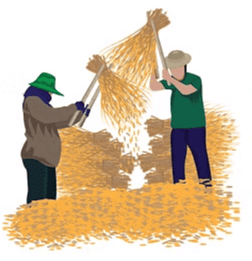 Threshing
Threshing
Question 2:
Which of the following is a characteristic of damaged seeds?
Option A: They sprout quickly
Option B: They float on top of water
Option C: They have a higher yield
Option D: They require less sunlight
 View Answer
View Answer 
Answer: Option B
Solution:
- Damaged seeds float on water due to air pockets that develop within them, making them less viable for planting.
- This characteristic can help farmers identify which seeds are not suitable for sowing.
- It's fascinating to note that some farmers use this method as a simple test for seed quality before planting.
Question 3:
What is the first step before growing crops?
Option A: Irrigation
Option B: Harvesting
Option C: Preparation of the soil
Option D: Sowing
 View Answer
View Answer 
Answer: Option C
Solution:
- The preparation of the soil involves several activities, including plowing and leveling, which are crucial for creating favorable conditions for plant growth.
- Proper soil preparation not only enhances the soil's fertility but also improves water retention.
- An additional fact is that different crops may require different soil preparation techniques, highlighting the importance of tailored agricultural practices.
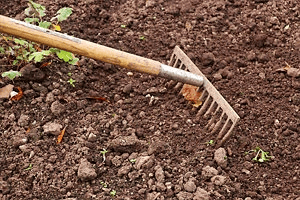 Soil Preparation
Soil Preparation
Question 4:
Which of the following methods helps conserve water in irrigation?
Option A: Flood irrigation
Option B: Drip irrigation
Option C: Surface irrigation
Option D: Manual watering
 View Answer
View Answer 
Answer: Option B
Solution:
- Drip irrigation is an efficient method that delivers water directly to the roots of plants, minimizing evaporation and runoff.
- This method significantly reduces water wastage compared to traditional irrigation techniques.
- Interestingly, drip irrigation can increase crop yield and quality, making it a sustainable choice for farmers facing water scarcity.
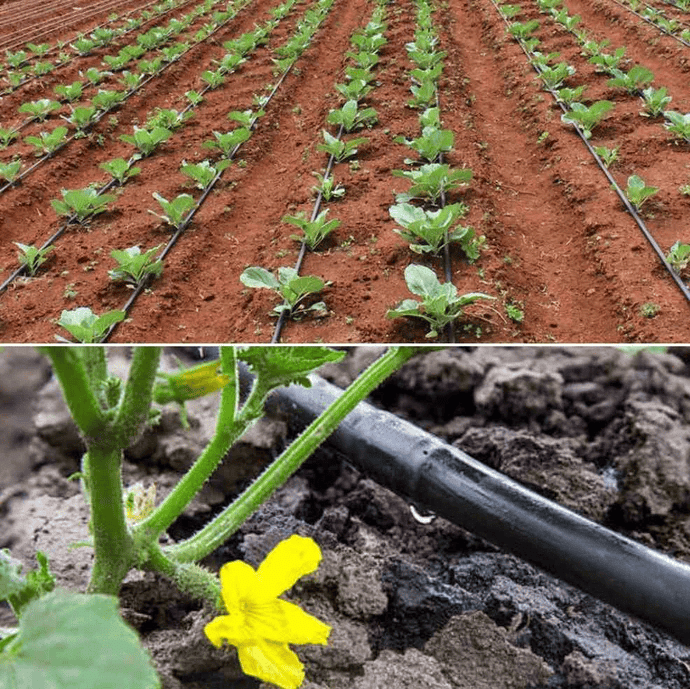 Drip Irrigation
Drip Irrigation
Question 5:
What is the primary benefit of crop rotation?
Option A: Increases water usage
Option B: Reduces soil fertility
Option C: Controls pests and diseases
Option D: Requires more manual labor
 View Answer
View Answer 
Answer: Option C
Solution:
- Crop rotation helps control pests and diseases by disrupting their life cycles.
- This practice enhances soil health and fertility by preventing nutrient depletion associated with continuous cropping of the same species.
- Crop rotation can also improve overall biodiversity on a farm, which is beneficial for the ecosystem.
Question 6:
Which type of crops are sown with the onset of the monsoon?
Option A: Rabi crops
Option B: Kharif crops
Option C: Cash crops
Option D: Food crops
 View Answer
View Answer 
Answer: Option B
Solution:
- Kharif crops are sown with the onset of the monsoon and harvested at the end of the rainy season.
- Examples include paddy and maize, which thrive in the warm, wet conditions typical of this season.
- Interestingly, the timing of sowing these crops is crucial for maximizing yield, making it a vital practice in agriculture.
Question 7:
What is organic manure made from?
Option A: Synthetic chemicals
Option B: Decomposed organic matter
Option C: Mineral fertilizers
Option D: Pesticides
 View Answer
View Answer 
Answer: Option B
Solution:
- Organic manure is derived from decomposed organic matter, such as animal excreta and plant waste.
- This natural fertilizer enhances soil fertility and promotes healthy plant growth.
- Organic manure improves soil structure and moisture retention, contributing to sustainable agriculture.
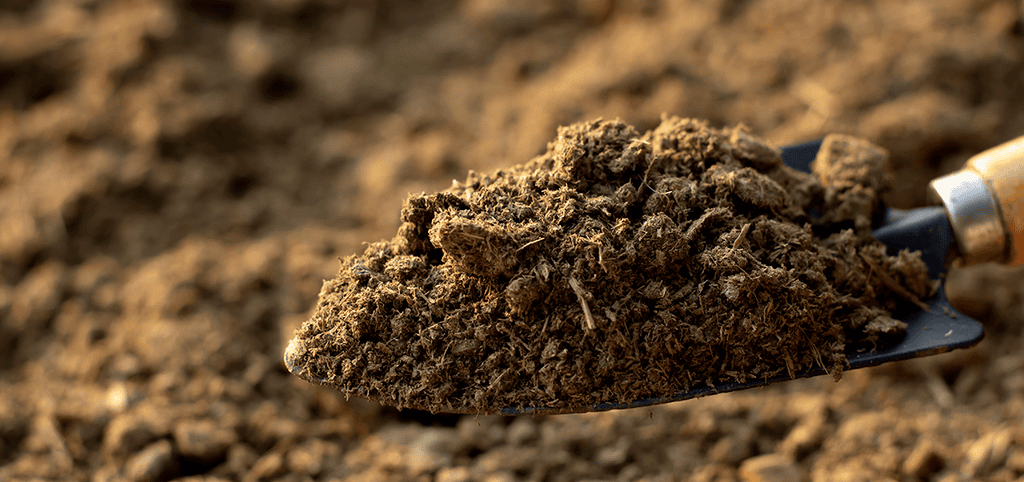 Manure
Manure
Question 8:
Which method is used to remove unwanted plants from a crop field?
Option A: Sowing
Option B: Threshing
Option C: Weeding
Option D: Plowing
 View Answer
View Answer 
Answer: Option C
Solution:
- Weeding involves removing unwanted plants that compete with crops for resources.
- This can be done manually or with chemicals known as weedicides.
- Regular weeding is crucial for maximizing crop yields and minimizing competition for nutrients.
Question 9:
What happens if wheat is sown in the Kharif season?
Option A: The crop yields high returns
Option B: The crop fails due to unsuitable conditions
Option C: The crop matures faster
Option D: The crop requires less irrigation
 View Answer
View Answer 
Answer: Option B
Solution:
- Wheat is not suitable for the Kharif season because it requires mild temperatures and frost-free conditions.
- Sowing wheat during this time can lead to poor yields due to high temperatures and excessive moisture.
- Interestingly, farmers need to be aware of seasonal changes to optimize their planting schedules for better crop success.
Question 10:
Which irrigation method mimics natural rainfall?
Option A: Drip irrigation
Option B: Surface irrigation
Option C: Sprinkler irrigation
Option D: Flood irrigation
 View Answer
View Answer 
Answer: Option C
Solution:
- Sprinkler irrigation simulates natural rainfall by distributing water through pipes and nozzles.
- This method is beneficial for irrigating large areas and can be adjusted according to the crop's needs.
- A notable advantage is that well-designed sprinkler systems can significantly reduce water loss through evaporation, making them efficient for water conservation.
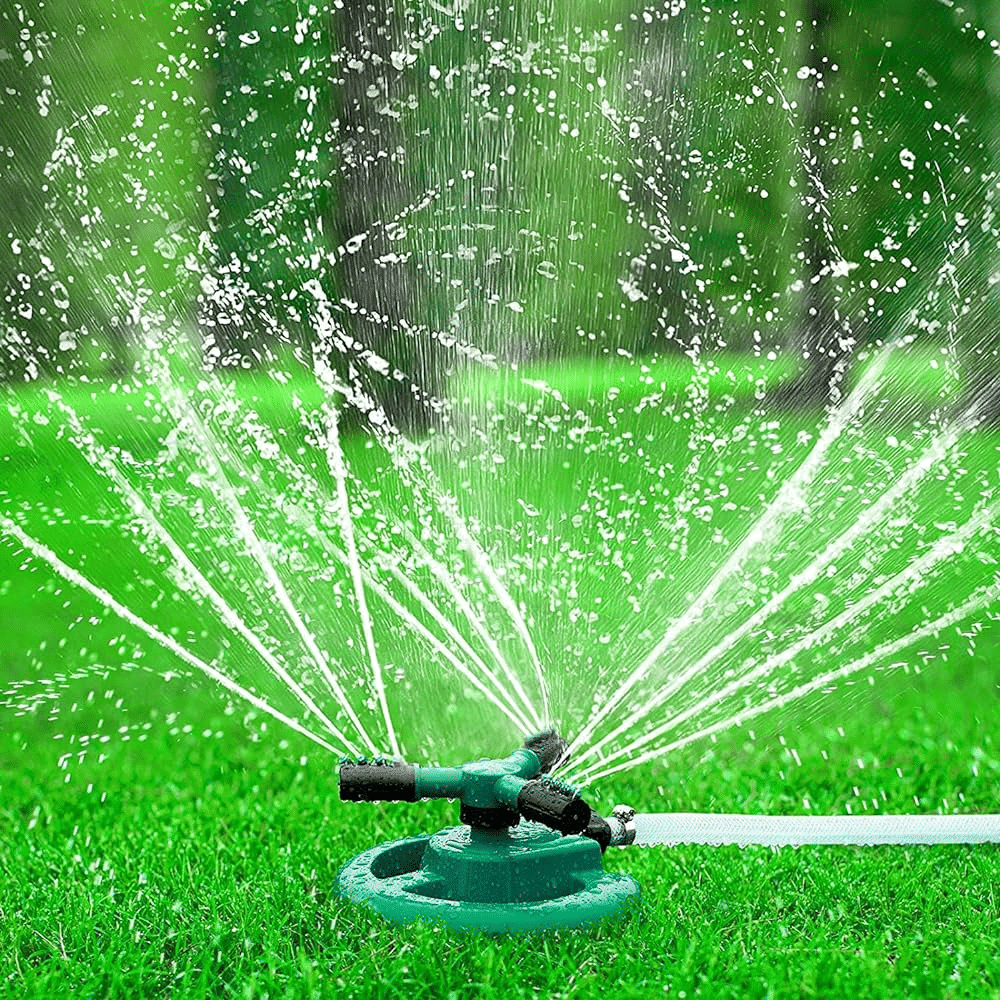 Sprinkler
Sprinkler
Question 11:
What is the main disadvantage of continuous cropping?
Option A: Increased soil fertility
Option B: Decreased crop diversity
Option C: Higher yields
Option D: Less need for irrigation
 View Answer
View Answer 
Answer: Option B
Solution:
- Continuous cropping leads to decreased crop diversity, which can result in pest and disease problems and nutrient depletion in the soil.
- Crop rotation is often recommended as a solution to maintain soil health and improve biodiversity.
Question 12:
Which of the following statements about chemical fertilizers is true?
Option A: They are made from organic matter.
Option B: They are synthetic substances for plant growth.
Option C: They improve soil structure.
Option D: They are primarily used in organic farming.
 View Answer
View Answer 
Answer: Option B
Solution:
- Chemical fertilizers are synthetic substances added to the soil to provide essential nutrients, helping boost crop yields.
- However, over-reliance on chemical fertilizers can lead to soil degradation over time.
- The careful balance of nutrient application can significantly impact crop health and sustainability in farming.
Question 13:
What is the role of irrigation in agriculture?
Option A: To increase crop diversity
Option B: To provide artificial water supply to crops
Option C: To prepare soil for sowing
Option D: To control pests and diseases
 View Answer
View Answer 
Answer: Option B
Solution:
- Irrigation is the artificial application of water to assist in the growth of crops, especially in areas with insufficient rainfall.
- It plays a critical role in ensuring consistent water supply, thus improving crop yields.
- Efficient irrigation methods can greatly enhance food security by maximizing agricultural productivity in water-scarce regions.
Question 14:
Which of the following describes organic manure?
Option A: Made from synthetic chemicals
Option B: Natural fertilizers from decomposed organic matter
Option C: Primarily used for pest control
Option D: Enhances water retention
 View Answer
View Answer 
Answer: Option B
Solution:
- Organic manure is derived from animal waste and plant matter.
- It improves soil fertility and promotes healthy plant growth while enhancing soil structure and water retention.
- This natural fertilizer is a sustainable option that supports long-term soil health and reduces the need for chemical inputs.
Question 15:
Which of the following is a primary method of preserving soil fertility?Option A: Overgrazing
Option B: Crop rotation
Option C: Monoculture
Option D: Excessive use of chemical fertilizers
 View Answer
View Answer 
Answer: Option B
Solution:
- Crop rotation involves alternating different types of crops in the same area across seasons.
- This practice helps maintain soil fertility by: Restoring nutrients that specific crops may deplete.
- Reducing pest and disease cycles associated with monoculture.
- Enhancing overall biodiversity on a farm.
|
92 videos|419 docs|44 tests
|
FAQs on MCQ (Solution) - Crop Production Management - Science Class 8
| 1. What is crop production management? |  |
| 2. What are the key factors affecting crop production? |  |
| 3. How can farmers improve soil fertility? |  |
| 4. What is the importance of irrigation in crop production? |  |
| 5. How can pests and diseases be managed in crop production? |  |






















